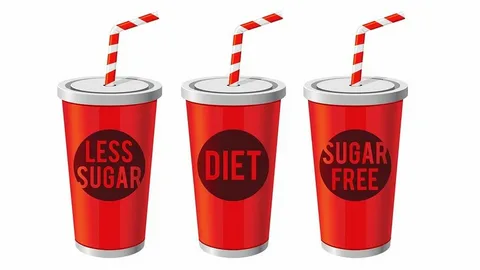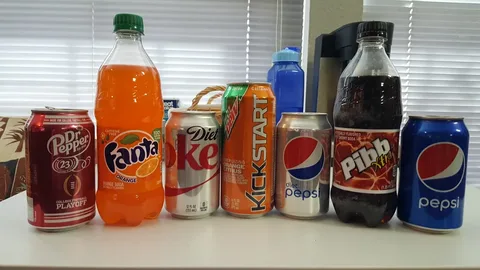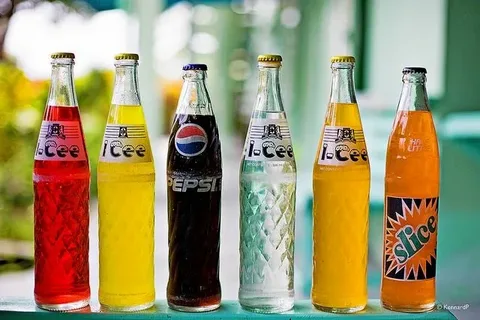Introduction
Soda pop, a beloved beverage enjoyed by millions worldwide, has been the subject of numerous myths and misconceptions. In this article, we will debunk some of the most common myths surrounding soda pop and separate fact from fiction. By doing so, we aim to provide a clearer understanding of this popular drink and its impact on health.

Myth 1: Soda Pop Causes Immediate Weight Gain
One of the most pervasive myths is that drinking soda pop will cause immediate weight gain. While it’s true that soda pop contains calories, weight gain is a result of consuming more calories than your body needs over time. Moderation is key. Enjoying a soda occasionally as part of a balanced diet is unlikely to cause significant weight gain.
Myth 2: Diet Soda is a Healthy Alternative
Diet soda is often marketed as a healthier alternative to regular soda because it contains fewer calories. However, research suggests that artificial sweeteners used in diet sodas may have their own health risks. Some studies indicate that they can disrupt metabolism and increase cravings for sugary foods. It’s essential to consume diet soda in moderation and be aware of its potential effects.
Myth 3: Soda Pop is Hydrating
Many people think soda can quench their thirst and keep them hydrated, but this is misleading. Soda often contains caffeine, a diuretic that increases urine production and can contribute to dehydration rather than preventing it. Additionally, the high sugar content in soda can lead to a temporary energy spike, followed by a crash, without providing lasting hydration. While soda might seem refreshing, it’s not an effective way to stay hydrated. Water remains the best choice for proper hydration, as it replenishes fluids without the dehydrating effects of caffeine or sugar.
Myth 4: Clear Sodas are Healthier
Clear sodas, such as lemon-lime or ginger ale, are often perceived as healthier options compared to darker sodas like cola. However, the color of the soda does not determine its healthiness. Both clear and dark sodas can contain high levels of sugar and artificial additives. It’s essential to read the labels and make informed choices.

Myth 5: Soda Pop is a Good Source of Energy
Soda pop is often consumed for a quick energy boost due to its sugar content. While it can provide a temporary spike in energy levels, this is usually followed by a crash. The rapid rise and fall in blood sugar levels can leave you feeling more tired than before. Opt for healthier sources of energy, such as fruits and whole grains.
Myth 6: Soda Pop is Safe for Teeth
Soda pop is highly acidic and can erode tooth enamel, weakening the protective layer of your teeth. The combination of sugar and acid creates an environment that encourages bacteria growth, leading to tooth decay. Over time, frequent soda consumption can result in cavities and other dental issues. To protect your teeth, it’s important to limit soda intake and maintain proper oral hygiene by brushing and flossing regularly. Drinking water instead of soda or using a straw can also help minimize direct contact between the soda and your teeth, reducing the risk of enamel erosion.
Myth 7: Soda Pop is Addictive
Some people believe that soda pop is addictive due to its sugar and caffeine content. While it’s true that these ingredients can create cravings, soda pop is not inherently addictive. However, excessive consumption can lead to dependence on the sugar and caffeine, making it challenging to reduce intake.
Myth 8: Soda Pop is a Good Source of Nutrients
Soda pop is often considered an empty-calorie beverage because it provides little to no nutritional value. It lacks essential vitamins and minerals that are necessary for overall health. Relying on soda pop as a source of nutrients can lead to deficiencies and health issues.

Myth 9: Soda Pop is Safe for Children
Children are especially vulnerable to the harmful effects of soda due to its high sugar content, which can lead to obesity and dental issues. Excessive sugar intake increases the risk of cavities and weight gain. Additionally, the caffeine found in many sodas can negatively impact their developing nervous systems, causing sleep disturbances and increased anxiety. To promote healthier growth, it’s important to limit children’s soda consumption and encourage better alternatives like water, milk, or natural fruit juices. Teaching healthy habits early can help protect kids from long-term health issues linked to sugary drinks.
Myth 10: Soda Pop is a Natural Product
Many people assume that soda pop is a natural product because it contains ingredients like carbonated water and flavorings. However, most sodas are highly processed and contain artificial additives, preservatives, and sweeteners. It’s essential to be aware of the ingredients in your soda and make informed choices.
Conclusion
soda pop is a popular beverage that has been surrounded by numerous myths and misconceptions. By debunking these myths, we hope to provide a clearer understanding of soda pop and its impact on health. Remember, moderation is key, and making informed choices can help you enjoy soda pop without compromising your well-being.